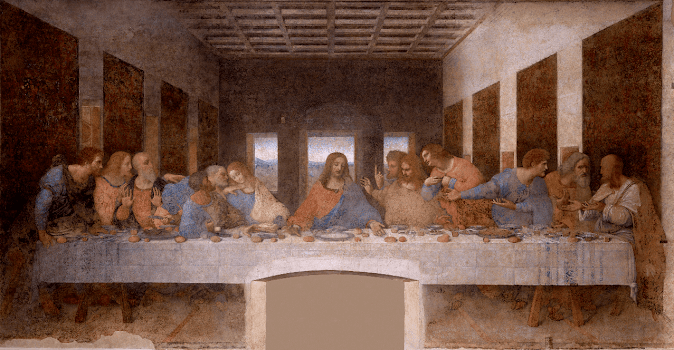 |
The prior of the Santa Maria delle Grazie monastery was visibly irritated as he saw Leonardo, without a paintbrush, standing and staring at his partly drawn painting on the wall of the dining hall of the monastery. For the whole day, Leonardo hadn't touched the wall. He seemed to be living in a different world. There was no other sight or sound that could draw his attention than the painting in the making.
It wasn't the first time. Some times, Leonardo wouldn't turn up at the monastery for weeks. Those days, he would be found somewhere outside the city, looking at a bird with searing intensity, or somewhere near a pool, looking at the water and scribbling something in a notebook that he always carried with him. Some other times, he would come early in the morning to the monastery, mount the scaffolding, and start painting without a minute's rest, not speaking to anyone and not even stopping for food or drink, till the curtain of dusk is drawn for the day. There were days, when he would simply stand at a distance, watching the painting, and occasionally speaking to himself in angry and frustrated tone. And then there were other days, when he would rush to the monastery at some random hour, as if caught by some frenzy, reach for a paintbrush, apply a stroke or two, and then disappear from the place with equal speed.
This had been going on for a year, but the painting was nowhere near its completion. The prior was annoyed to death by Leonardo's erratic behaviour. He could stand it no more. He went to Ludovico Sforza, the then Duke of Milan and patron of Leonardo, and complained about Leonardo's conduct. Ludovico, who was already worried by that time, was prompted to summon Leonardo to his court to discuss on the matter. But before Ludovico could realize, the discussion had turned into one about how creativity works. As the discussion went on, sun was already inching towards the west sky.
At the end, Ludovico appreciated Leonardo's genius, but requested him to speed up the work, while also letting him know of the prior's complaint. Leonardo mentioned that there were only two heads left to paint: one that of Jesus, and the other of Judas. Then he added that he was having difficulty in finding a model for Judas, but would gladly use the head of the prior for the same to wrap up the work quickly! When the prior came to know about this, he was dumbfounded and felt sick at ease. Never again after that he spoke of his annoyance caused by Leonardo's quirky work habits.
After pushing deadlines further several times, after a year from then, The Last Supper was finally there for everyone to see. Spanning 15 feet high and 29 feet wide, this painting has stood as a wondrous spectacle of art.
Comments
Post a Comment